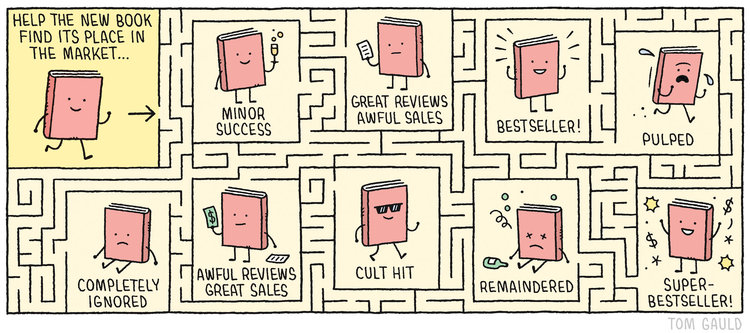Paul Whybrow
Full Member
I came across this article in one of the newsletters I subscribe to, which is well worth a read:
Six Myths About Traditional Publishing | BookBaby Blog
Steven Spatz sums up what's wrong with traditional publishing while pointing out some of the advantages of self-publishing. He's the founder of self-publishing company BookBaby, so it could be said he's got a vested interest, but there's still no denying what he says about the iniquities of traditional publishing.
Steven Spatz – The Writing Cooperative
As I've said before on the Colony, selling your soul to a publisher amounts to slavery. Who else works for 15% of the takings made from their work, but an author? As I begin another joyless round of querying, I increasingly think that I'm headed in the wrong direction and that I should redirect my energies towards self-publishing.
Publishers are paying writers a pittance, say bestselling authors
It's tough for dreamy writers to face up to, but publishing is first and foremost a business. It's not intended to be a benevolent way of sharing lovely stories to make readers happy. One of the first reality checks any wannabe author should make is to look at their book as a commercial product...view it as a can of baked beans trying to find a place on already crowded supermarket shelves of established brands of beans that consumers know and trust.
Getting real in this way is difficult, for we're preoccupied with creating the best manuscript we can, neatly edited and ready to knock the socks off readers who'll be captivated by our story-telling skills.
I take solace and inspiration from thousands of quotes about writing that I've collected over the years, but it's the advice on publishing that's captured my attention lately, as I consider how to promote and sell my five Cornish Detective novels:
"We don't sell books", a publisher said, "we sell solutions to marketing problems."
From Negotiating With The Dead by Margaret Atwood
Writing is the hardest way of making a living, with the possible exception of wrestling alligators.
William Saroyan
I don't have fans. I have customers. I'm a writer. I give 'em what they wanna read.
Mickey Spillane (from a 1981 People magazine interview)
Publishers don't nurse you; they buy and sell you.
P.D. James

Six Myths About Traditional Publishing | BookBaby Blog
Steven Spatz sums up what's wrong with traditional publishing while pointing out some of the advantages of self-publishing. He's the founder of self-publishing company BookBaby, so it could be said he's got a vested interest, but there's still no denying what he says about the iniquities of traditional publishing.
Steven Spatz – The Writing Cooperative
As I've said before on the Colony, selling your soul to a publisher amounts to slavery. Who else works for 15% of the takings made from their work, but an author? As I begin another joyless round of querying, I increasingly think that I'm headed in the wrong direction and that I should redirect my energies towards self-publishing.
Publishers are paying writers a pittance, say bestselling authors
It's tough for dreamy writers to face up to, but publishing is first and foremost a business. It's not intended to be a benevolent way of sharing lovely stories to make readers happy. One of the first reality checks any wannabe author should make is to look at their book as a commercial product...view it as a can of baked beans trying to find a place on already crowded supermarket shelves of established brands of beans that consumers know and trust.
Getting real in this way is difficult, for we're preoccupied with creating the best manuscript we can, neatly edited and ready to knock the socks off readers who'll be captivated by our story-telling skills.
I take solace and inspiration from thousands of quotes about writing that I've collected over the years, but it's the advice on publishing that's captured my attention lately, as I consider how to promote and sell my five Cornish Detective novels:
"We don't sell books", a publisher said, "we sell solutions to marketing problems."
From Negotiating With The Dead by Margaret Atwood
Writing is the hardest way of making a living, with the possible exception of wrestling alligators.
William Saroyan
I don't have fans. I have customers. I'm a writer. I give 'em what they wanna read.
Mickey Spillane (from a 1981 People magazine interview)
Publishers don't nurse you; they buy and sell you.
P.D. James


